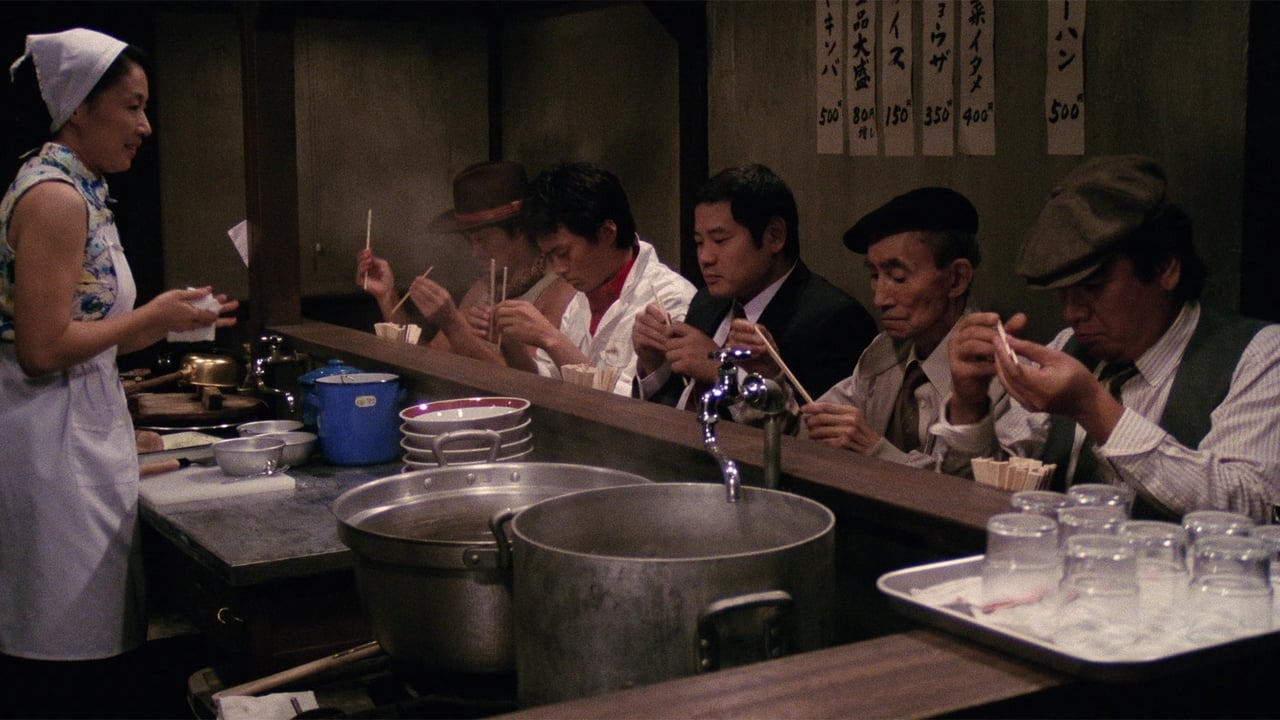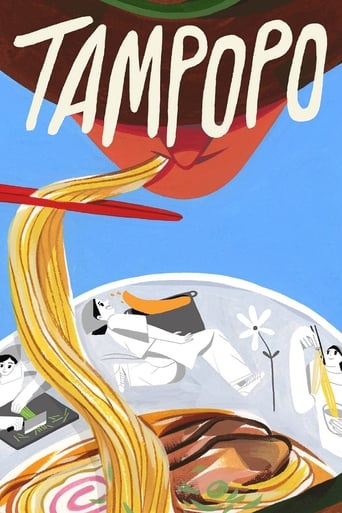

Purely Joyful Movie!
... View MoreI am only giving this movie a 1 for the great cast, though I can't imagine what any of them were thinking. This movie was horrible
... View MoreIf you're interested in the topic at hand, you should just watch it and judge yourself because the reviews have gone very biased by people that didn't even watch it and just hate (or love) the creator. I liked it, it was well written, narrated, and directed and it was about a topic that interests me.
... View MoreThis is a dark and sometimes deeply uncomfortable drama
... View MoreTruck driver Gorô and his young sidekick Gun (Ken Watanabe) stop at a rather sad looking noodle shop. They rescue a boy outside from bullies who turns out to be the son of the widowed shop owner Tampopo. Her noodles are not good and she begs Gorô to be her teacher. In desperation, she even tries to buy and steal a soup recipe. They find homeless people who are cooks. With other experts' help, they refine the noodle shop to greater heights. Meanwhile, there is a gangster in a white suit and his girlfriend testing the boundaries of food erotica. Others vignettes also show people with food.This is a strange and wonderful celebration of food. The characters are lovely. Gorô is a cowboy of sorts and even has the hat. It treats the noodle with reverence. Not all of the minor vignettes work but they add to the quirkiness. The old lady who squeezes is odd as hell although I wouldn't call it funny. It's an unusual movie wrapped around a sweet noodle story.
... View Morei liked the obsessiveness about food and the typically Japanese things in it. The search for the perfect noodle soup and in order to achieve that goal you go all the way. Perfection is in the details and the devotion. Concentration. It shows that in Japan, there is only one way to do things: the samurai way!But i liked especially the scenes that had nothing to do with the main story in the film. very funny absurdness. And of course the slow pace, the attention, no the complete devotion and the honor that Japanese people dedicate to things of QUALITY! IVery fulfilling film that you'd want to watch again. Soon. many scenes leave you behind wondering what had happened. in a good way.
... View MoreThis is a great movie about food, relationships and romance. Main theme is the love to food. If you want to, you can understand it as a symbolism for the love to life. This makes the movie a very optimistic, and heartwarming movie. Sometimes the side-stories don't seem to fit, or seem a bit pointless. And sometimes the acting isn't very good. The humor though is great, it's never too silly and made me smirk almost the whole movie. Overall this is a good, arty movie, that doesn't really want to teach you anything, but the love to food and life. - I got hungry even thought I have been eating throughout the whole movie myself.
... View MoreWho doesn't love food?Itami Juzo's Tampopo is a heartwarming film about people who love, and are often obsessed with, food. The main narrative follows two truck drivers, Gun (Yamazaki Tsutomu) and Goro (Watanabe Ken) who stumble upon a run down, unpopular ramen noodle shop. The shop's owner, Tampopo (Miyamoto Nobuko), is running it all by herself and isn't too experienced in the "art" of making good ramen. After a brawl, Gun and Goro take it upon themselves to improve Tampopo's cooking and redefine her shop. The film not only focuses on this narrative, but is interspersed with brilliantly transitioned scenes of people's interaction with food: a white-suited yakuza (Yakusho Koji) and his mistress perform erotic acts with food, a group of homeless turn out to be master chefs, a young corporate subordinate upstages all of his superiors with his knowledge of French cuisine at an expensive dinner, an old lady sneaks around in a supermarket just to feel the food, among others.Never missing a step, Yamazaki Tsutomu fully embodies the character of Gun. His tough assertiveness, along with the willingness to fight and instigate others, gives him many of the characteristics that John Wayne's famous cowboy persona's had. In fact, the entire cast is filled with likable, charismatic characters. Tampopo is spunky, determined, and easy to root for–we want her to succeed in her quest for ramen- making perfection. Yakusho Koji is also a welcome presence with his depiction of the erotic possibilities of food; in one scene he cracks an egg and the yolk is passed around between his mouth and his beautiful mistress's. It is ultimately the way in which these characters are portrayed on screen that gives them such a likable presence. Food is universally loved–showing characters and their intense passion for food strikes a chord with everybody. It also makes you hungry.Itami's use of scene transitions is brilliant in its unobtrusiveness. Scenes suddenly shift without the viewer even noticing–it's seamless perfection. For example, there is a scene in which Tampopo is exercising outside under Gun's supervision when a group of businessmen in suits walks past. The camera decides to follow the businessmen to their destination, a French restaurant, to watch them order their food, then follows the waiter out into the main seating area where it stops to observe a group of women receiving a lesson on proper Western dining etiquette (eating without slurping although a Western man in the restaurant is slurping his noodles loudly, much to the chagrin of the teacher). As the businessmen's waiter passes through, the camera follows him back to the business party. You can't help but enjoy the way this all works–the transitions make for a creative and ultimately successful approach to telling a story with multiple plot lines and random happenings.Itami created a masterpiece here, one that should be seen and loved by everyone. There are not many films that display the kind of warm splendor that Tampopo emanates. You cannot avoid smiling throughout the movie. The characters become deeply involving and one cannot help but feel connected with them. This is the ultimate film for food lovers. Try to avoid the pangs hunger while watching. I couldn't.
... View More